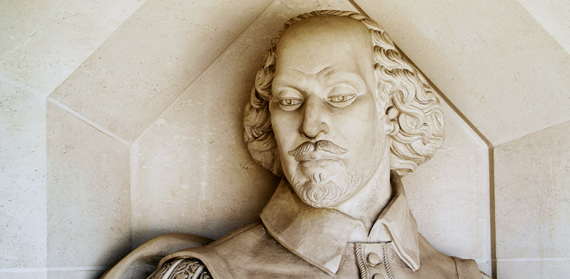Still relevant four hundred years on/Shutterstock
Guest post by Alessandro Merendino, Centre for Business in Society
William Shakespeare is undoubtedly one of the best known writers across the world. Indeed, not surprisingly this year his 400th anniversary is celebrated to commemorate his genius-ness, namely 38 plays, 154 sonnets and 2 poems in just under 24 years.
Believe it or not, some of Shakespeare’s attributes are actually quite similar to us researchers. How you wonder? Bear with me.
Firstly, creativity. To produce something new and innovative that appeals to the minds of others. Shakespeare was able to produce a wide and diverse range of masterpieces that varied in terms of topics, poetries metre, types of characters and content which were innovative, new and original. As a researcher, we too, need a creative attitude, because we seek to generate new ideas and discover innovative insights, with the ability to then transform them into a valuable end product (e.g. a scientific paper, a patent, a journal, a policy reform, new business practice etc.). Some higher educational institutions enforce constraints and restrictions by which you are bound as a researcher, so that you don’t digress from what you are supposed to be researching. However, it doesn’t mean that you can’t be creative. For example, when I was testing a theory, I realised it did not work, i.e. it was unable to explain my results. I found there was room to build up another approach that may be useful for other research. So I finished the first paper about the failure of that theory and started writing up other two manuscripts about a new approach on corporate governance.
Secondly, serendipity (believe it or not) is another component that Shakespeare was subject to, and so are we. Serendipity is something that occurs by accident. For example, whilst we are walking we might bump into an old friend, we might be thinking about something that triggers another thought or idea, or we might be reading, or simply sleeping when something unexpected pops into our minds or occurs to us. Shakespeare had inspiration for his masterpieces from mythology, older Latin and Greek books, Scandinavian tales and real events that occurred in England or Italy. Indeed, when he casually came across some compelling anecdotes, manuscripts, or accidentally overheard some discussions, he was able to draw on them as a fuel for his next plays. Researchers are pretty much subject to this too. We too get inspiration from old manuscripts, new books, or nowadays overhearing a TV or radio programme can unexpectedly give us the information that we never thought we needed. So it seems that serendipity seems to be another key ingredient that makes a researcher successful. How can we acquire serendipity then? As neurosciences (Levitin, 2014) suggest a good sleep is essential for our creativity and acceptance of serendipity as it allows our brain to function better during the day. As serendipity unexpectedly occurs, it is better to be subconsciously prepared for the eventuality of the unexpected.
To conclude, creativity and serendipity are the key ingredients that make a researcher, hopefully, a magnificent innovator of knowledge, like Shakespeare. Being creative in research terms means thinking beyond the data in front of you and looking at the bigger picture. This will open up more questions for you to consider, hopefully, adding a unique perspective on your chosen topic. You may not be the best at dealing with things that happen unexpectedly, but you may good at being creative. There is always something that makes us tick, motivates us and drives us to do better – Shakespeare used his skills and achieved what no one has been able to to date. We may not all be destined to be playwrights but we all possess the ability to achieve something through our different qualities, that’s what makes us all unique. For instance, I believe that researchers (certainly in CBiS) can definitely contribute to research efforts that aim to better understand society, as well as to test and develop theories to inform about social action and potentially ‘improve’ the world. To me that sounds like a pretty amazing team of ‘playwrights’.
View our current Research Opportunities here.
Acknowledgement. I would like to thank Dr Daniel Levitin from Stanford University Medical School and UC Berkeley who with his superb and eloquent book (‘The Organized Mind’) inspired me, without knowing it, to connect Shakespeare to our job, i.e. research.
Levitin, D. (2014). The Organized Mind. Thinking Straight in the Age of Information Overload. London: Penguin.




Comments are disabled